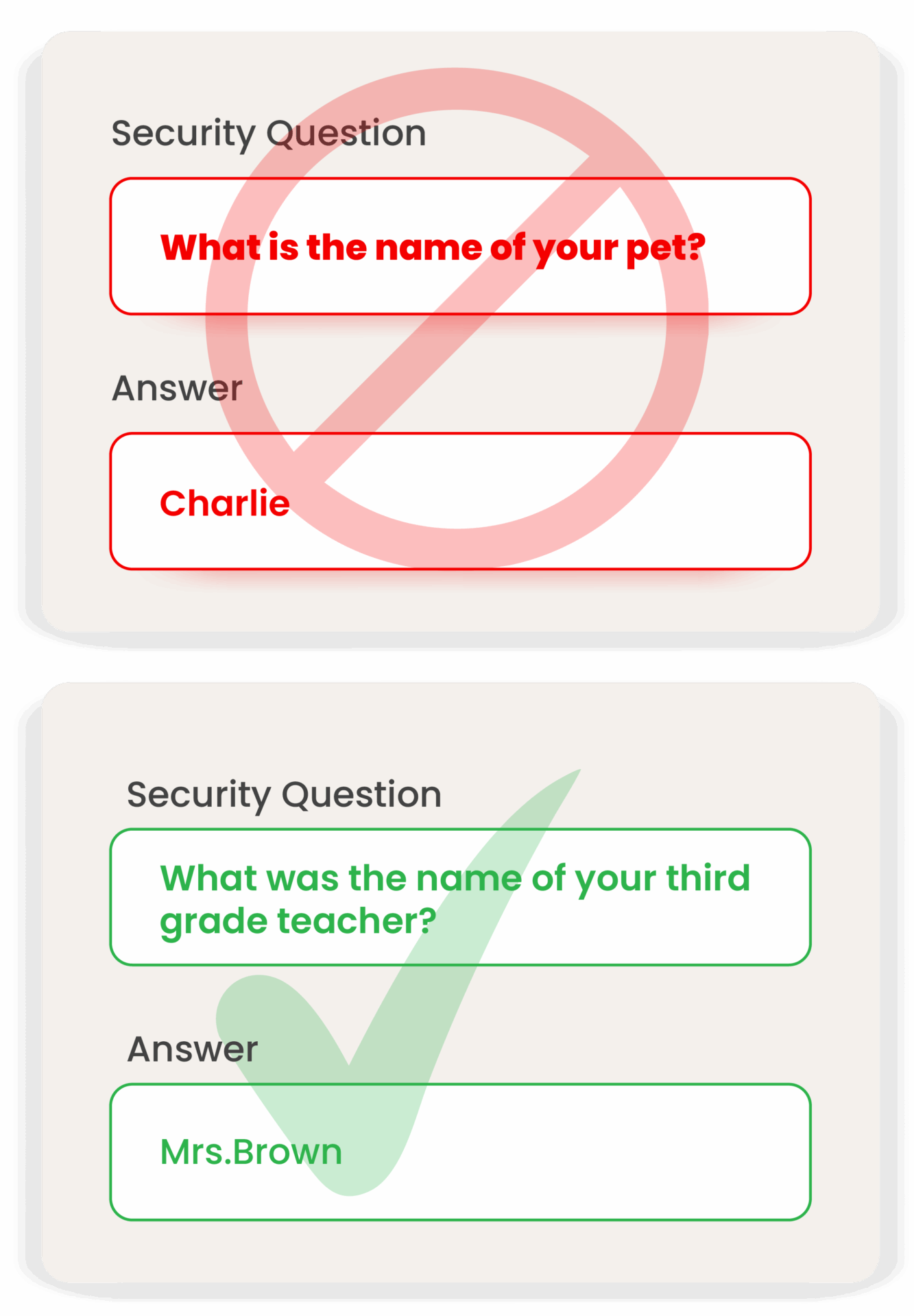Why You Need a Strong Security Question (and How to Set One Up)

When someone gains unauthorized access to an online account, it’s rarely due to the sophistication of their hacking skills. More often than not, they exploit weak points in the account recovery process—and one of the most commonly exploited weak points? Security questions. Setting up a strong security question is a simple yet highly effective way to protect your accounts from being hijacked.
Below, we’ll break down what security questions are, why they matter, the risks posed by weak ones, and how you can create foolproof security questions to shield your digital life.
What Is a Security Question?
A security question is a type of authentication method used to verify your identity when logging into or recovering access to an account. Typically used as part of the account recovery process, companies ask these questions to confirm who you are before granting access to sensitive information.
These questions often require you to provide answers tied to personal information, such as:
What is your mother’s maiden name?
What city were you born in?
What was the name of your first pet?
While this system is fairly straightforward, its effectiveness depends heavily on the quality of the question, and more importantly, the strength of your answer.
Why Security Questions Are Important
Security questions play a vital role in online account protection. Despite advancements in two-factor authentication (2FA) and biometric security, many platforms still rely on security questions as an additional layer of identity verification. When implemented properly, they serve as a second line of defense if your password has been compromised or forgotten.
For example:
Account Recovery: If you lose access to your email or social media accounts, answering a pre-set security question confirms your identity in the absence of a password.
Identify Verification: Even with advanced security measures in place, some platforms still use security questions as a backup verification process during suspicious logins.
Put simply, a strong security question could mean the difference between keeping your account secure and compromising sensitive data.
The Risks of Weak Security Questions
Unfortunately, not all security questions are created equal. Weak questions or answers—those that are easy to guess, easily searchable, or commonly used—pose significant vulnerabilities. Hackers often exploit this weakness as part of their toolkit. Common Risks Include:
Easy-to-Guess Answers
Questions like “What is your favorite color?” or “What is the name of your high school?” can be surprisingly easy to crack. Many answers to these questions can be guessed with basic knowledge about the account owner.
Publicly Available Information
An alarming amount of personal information can be unearthed online. Social media, for example, reveals answers to common security questions like your pet’s name or your birthplace, giving hackers a head start.
Reusing the Same Question Across Accounts
Just like secure passwords, reusing security questions exposes you to greater risk. If one account gets compromised, the same security question-answer pair could open the door to multiple accounts.
Oversharing Online
Personal details that seem innocent to share can inadvertently aid malicious actors. A casual tweet about your first car or a photo boasting about your childhood memories can provide critical information.

These vulnerabilities emphasize the importance of creating strong, unique security questions to minimize risk.
Tips for Creating Strong Security Questions
When it comes to security questions, the strength lies in crafting questions and answers that are both hard to guess and unique to you. Here’s how you can set up a strong security question:
Avoid Questions with Easily Searchable Answers:
Skip questions that can be answered by looking at public data or social media. For example:
- Don’t use common information like your birthday, pet name, or hometown.
- Choose questions that are less obvious or tied to obscure personal knowledge, like a childhood nickname only your family would recall.
Pick Questions with Stable Answers
Avoid questions where your answer is likely to change over time. For instance:
- “What is your favorite band?” might not remain consistent for years.
- Instead, choose a question tied to information that will stay the same, such as “What was the color of the first house you lived in?”
Be Creative with Your Answers
Flip the script and choose an answer that wouldn’t make sense to outsiders. For example:
- If the question is “What is your favorite childhood vacation spot?”, you could answer with something unrelated, like “sunflower49.”
- Just make sure it's memorable for you!
Use Questions that Only You Can Answer
The best security questions are those that tap into personal experiences unique to you. For example:
- “What was the name of your third-grade teacher?”
- This type of question reduces the chances that even someone close to you could guess it.
Keep Your Answers Private
Your security answers are no different from passwords—they should never be shared with anyone or stored in a place where they can easily be accessed.
Consider Multi-Factor Authentication (MFA)
While not directly tied to security questions, enabling MFA adds an additional layer of protection. It ensures that even if someone does guess your security question, they’ll need the second authentication factor to gain access.
How Security Questions Fit into the Bigger Picture
It’s important to view security questions as just one piece of the broader cybersecurity strategy. While they’re critical in account recovery and access verification, they are most effective when paired with other safeguards like strong passwords, MFA, and regular account monitoring.
Simple tips to level up your overall security:
- Use a password manager to create and store complex passwords.
- Regularly review security settings on your accounts.
- Stay informed about the latest phishing scams and tactics.
By treating your security question with the same care as your password, you create a smarter, more robust barrier against cyber threats.
How Security Questions Fit into the Bigger Picture
A strong security question does more than help you recover your account; it serves as an essential guardrail for protecting your personal information. While it’s easy to overlook their importance in favor of more advanced security measures, neglecting their strength could leave you vulnerable to attacks.
Remember, the best security questions are private, unique, and challenging to guess. By applying the tips above, you’ll have peace of mind knowing your accounts are far less likely to fall into the wrong hands. Take a moment now to check your current security questions—small adjustments today could save you big headaches tomorrow.
Share This
You May Also Like
5 Online Shopping Safety Tips
How to Protect Children and Teens Against Online Scams
Understanding Trigger Leads and Protecting Your Privacy
Want to learn more?
Discover additional resources and other financial topics by visiting our Financial Education Center.




